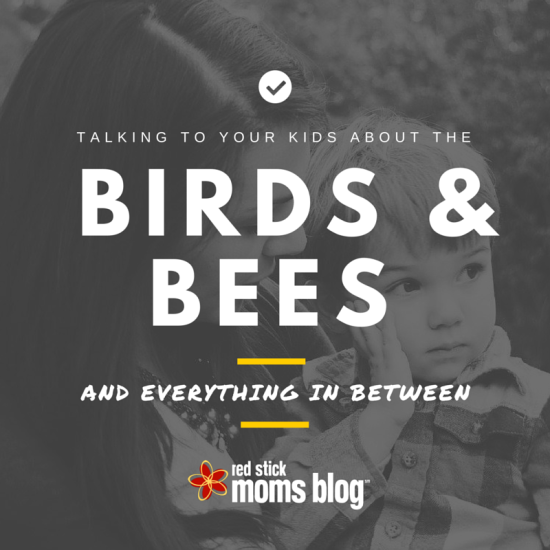 {For just this week, we are handing over our computers to the men in our lives and turning this little piece of the world wide web into Red Stick DADS Blog! Read along with their joys and their struggles, and find out why we are so very thankful to have these awesome dads in our lives.}
{For just this week, we are handing over our computers to the men in our lives and turning this little piece of the world wide web into Red Stick DADS Blog! Read along with their joys and their struggles, and find out why we are so very thankful to have these awesome dads in our lives.}
As a parent, life is full of new and daunting challenges. Some of which we tackle head on, some we reluctantly work through, and some we tend to avoid as long as possible. Unfortunately, “the sex talk” often falls under the latter category. As a counselor who deals with parents and children alike, I don’t think this is because of a general distaste for the subject matter or even the grueling selflessness that many other parenting endeavors require. In fact, I think it is actually a general feeling of inadequacy that often times leads us to put this issue on the back burner. Sure, it’s a little awkward and uncomfortable, but I don’t think that’s what keeps getting in our way. Actually, I rarely meet a parent who isn’t interested in learning better ways to talk to their kids about sex. So, here are a few things to consider when speaking to your child about sex.
1. Have discussions early and often. First of all, many parents think that the best time for teaching their kids about “the birds and the bees” is whenever they start dating. In actuality, it should be a gradual process throughout their adolescence. It’s best to begin discussing the basic workings of anatomy with your children before the onset of puberty. This is something that you can take a more educational and scientific approach on as well, which may help avoid some awkwardness. But, in essence, when parents ask me when they should discuss sex with their kids, my usual response is early and often. This will allow the subject to be spoken about more freely and with more confidence. Hopefully, it should feel more like a dinner table discussion than a pressured and fumbled-through, closed-door discussion. A good way to get your feet wet is to start using appropriate names for body parts. Don’t let words like “penis” and “vagina” become taboo words. Or if you have an older child and are having trouble getting feedback, ask what their friends at school are saying about sex. The more these discussions take place, the less awkward they will become.
2. Be available and open. Another important aspect to “the talk” is the content. Many parents are worried that if they discuss aspects of safe sex that their child will become more comfortable with having sex and in turn engage in it earlier and more often. Thankfully, this is just a myth. Today, kids are living in a hypersexual culture. The media is saturated with sex, and kids are saturated with the media. Historically, a child’s peers have been their primary source of gathering information about sex. And, in an age where kids are connected 24/7, the problem is only amplified. Parents must be a good, go-to source for their kids to seek information about sex. And for this to happen, it is important for parents to not try and deter their children from sex through scare tactics revolving around STD nightmares or teenage pregnancy—there are so many more important things to discuss when addressing the benefits of abstinence. Make sure to discuss the significant emotional and relational difficulties that often accompany early sexual behaviors, while at the same time pointing out how good healthy sexual behaviors are in a loving relationship later on in life. It’s an important goal not to paint sex as being a bad or shameful thing.
3. Cultivate a judgment-free zone. A common issue I’ve discovered between kids and parents when dialoguing about sex is that kids often get the impression that sex is bad, dirty, and shameful, and that if they mention anything about it to their parents, they are guilty by association. A parent’s primary goal should be able to facilitate a judgment-free zone for their kids to discuss and ask questions about sex, making sure to eliminate shame and guilt from the discussion and focusing on the positives of abstinence and healthy sexual relationships later in life. Many married couples who came from a home who shamed sex and considered it a taboo subject often have difficulty facilitating a healthy sexual relationship in their marriage. Simply put, parents who are willing to address the subject with their kids early, often, and in an environment free from negative labels will be very successful in healthily educating their kids about sex.
While all of these thoughts may feel very daunting at first, trust that your ability to parent and love your child will serve as the foundation to your effectiveness in educating your children about sex. Make sure to seek out resources and support as well. We begin protecting our kids from the moment they are born and begin to teach them how to live life well. Don’t let your child’s sex education be the one thing you never quite got around to. It’s never too late to start the discussion, so why not today? And, remember, early, often, and always in a positive and loving environment.























Great article! As a child, my mother was very open and frank about sex and what did or did not constitute a healthy sex life, without oversharing. This helped me get a good idea in my head of what my future relationship with my husband should be like, and after meeting several married women who have terrible sex lives because of their upbringings, I feel like my mother did the best thing she could have. She didn’t try to make sex glamorous or shameful, just normal.